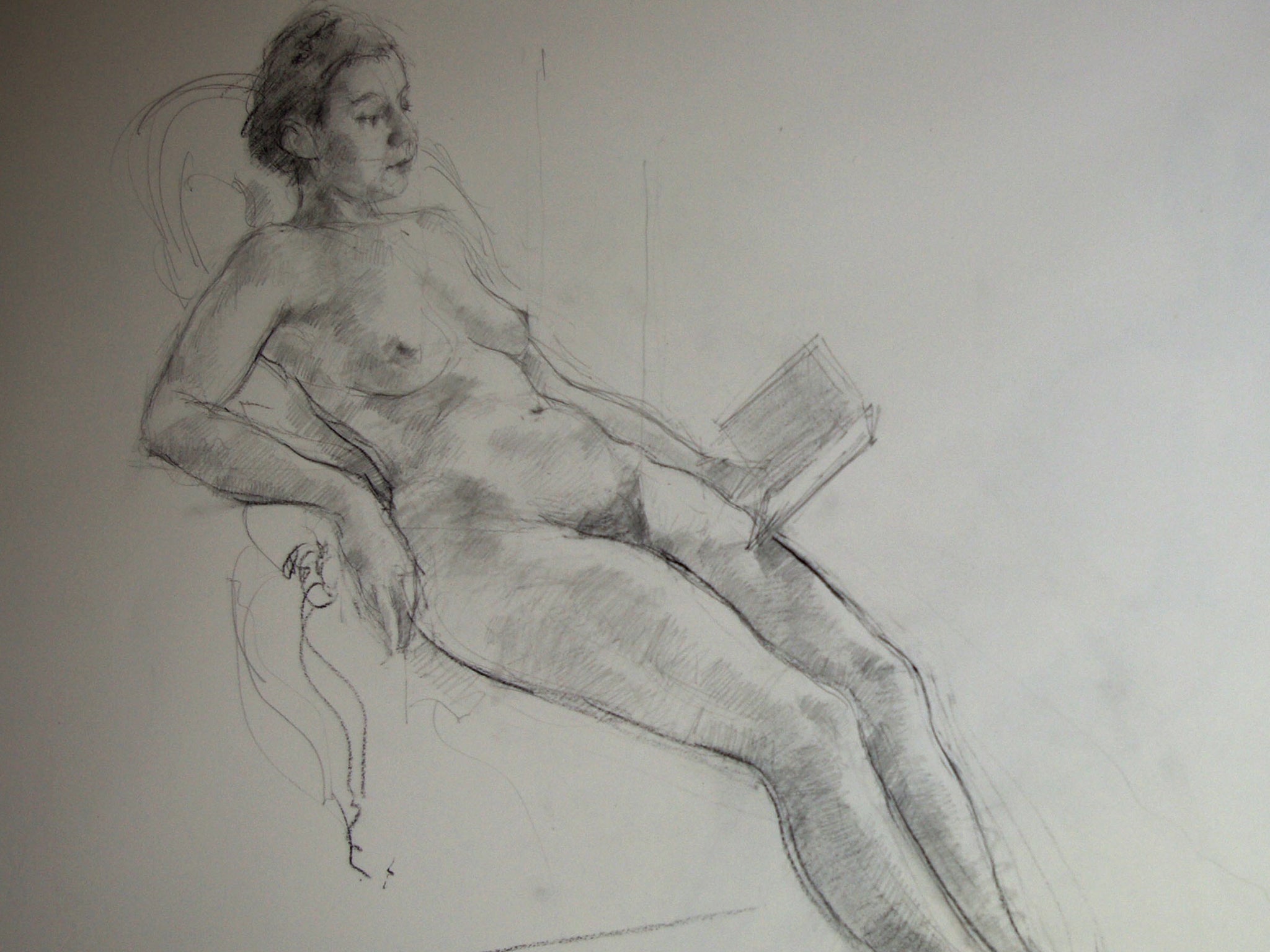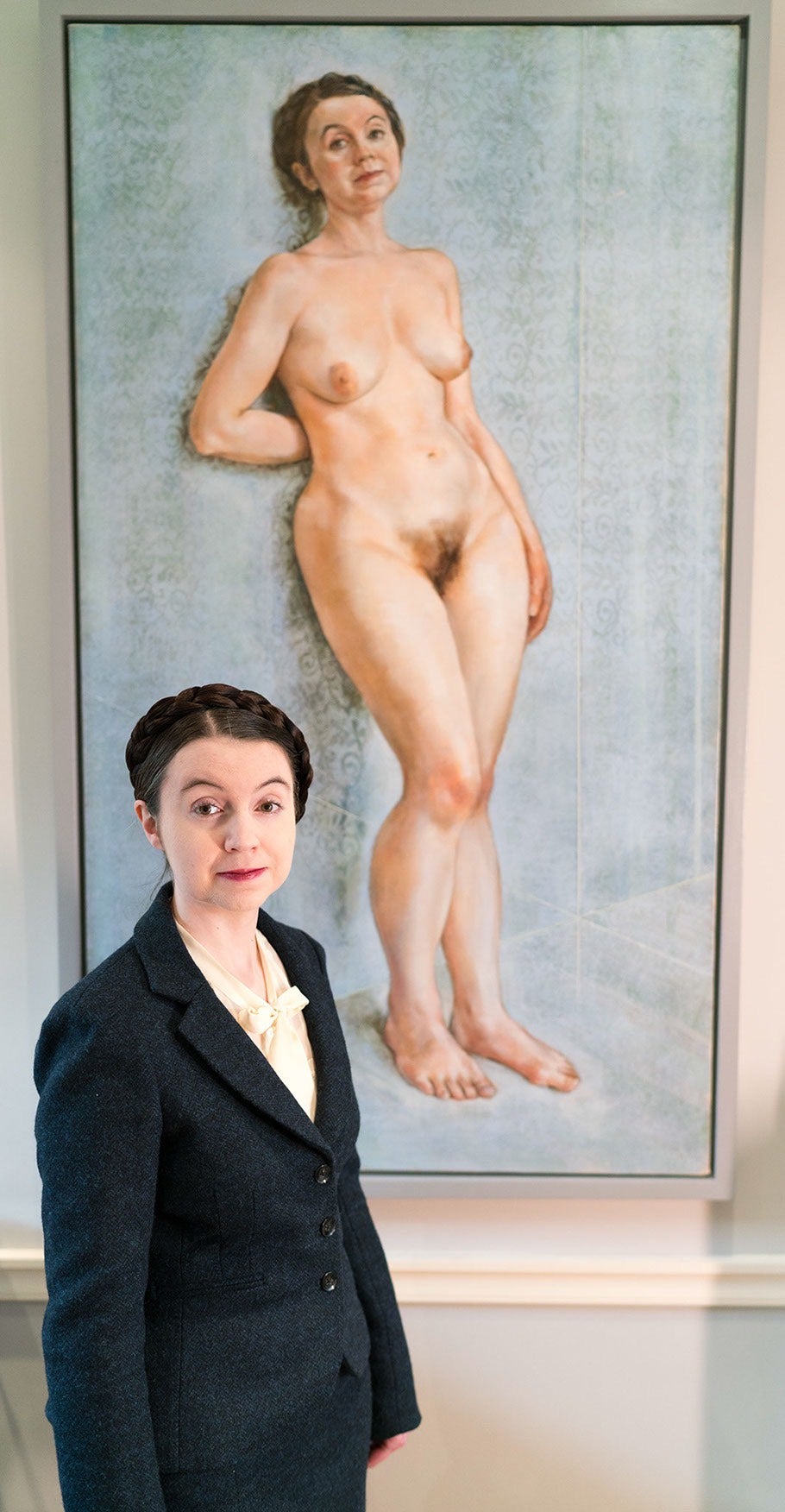‘I want to show that behind every naked woman is a real thinking woman’
Victoria Bateman is neither just a brain nor just a body, and she rejects the naive distinction between the two. She talks to Andy Martin about her latest book, in which she explains how women made the west rich


It was a lovely spring day,” Victoria Bateman recalls. A Friday shortly before Easter of 1994. She had just come top in a geography test. When her mother came to pick her up from school, with bags of clothes in the back of the car, she thought they were going on holiday to her grandparents’ caravan in Wales. In fact, her mother was leaving her father and they were driving away to a new life.
Growing up in Oldham, Victoria Bateman was always an outsider. She was too bookish to be part of the in-crowd. And she was “small and delicate” so she got bullied too. She was also broke. Once, when mugged by a hardcore mob of girls, she had her few pathetic coins thrown back in her face because they weren’t even worth stealing. Rejecting the label of “deserving poor”, she was too proud to accept free school meals.
“You want to hang on to your dignity and self-respect,” she says. Now, aged 39, and a Cambridge economist, she wants to have control over her own life and asserts the right to strip in public and give conference talks naked and be painted nude (as she was for the first time in 2014 by Anthony Connolly).
All of which provides the personal backdrop to her grand new theory – set out in The Sex Factor (published by Polity) – that it is the relative freedom of women that is responsible for the prosperity of the west. No, she does not say that patriarchy is an illusion or a mad conspiracy theory got up by radical feminists to scapegoat men. But freedom is a spectrum. As is wealth. Why are some countries rich and others poor? The “rise of the west” in the past five or six centuries is something of an anomaly in world history. But if you place a diagram of the degree of freedom enjoyed by women over a map of the world, you will find that it corresponds point for point to the history of growth: the freer, the greater the affluence; the less free, the greater and more grinding the poverty.
The nuclear family as we know it, broadly consensual, putting the emphasis on independence to the point of fragmentation and breakdown, leads directly to entrepreneurship and democracy and the so-called Protestant work ethic, which Bateman says is rooted in women’s freedom. “Cultures that are tolerant of individual differences are also those supportive of growth,” she writes. Or, as she puts it in one of her memorable slogans, “Autonomy is good for the economy”.
And yet all this has been systematically overlooked and omitted by the “grey science” of economics. When she went to Cambridge, Bateman found that a lot of what she was learning didn’t resonate with her own experience. “We build ever more complicated models,” she says, “but there is a lack of engagement with the real world.”
Only one in three economists is a woman. But more than that, economics has sold itself as a science, with highly mathematical credentials, working with numbers and statistics, and therefore gender-blind. As if women didn’t even exist. Which, to Bateman’s way of thinking, is fundamentally stupid, because homo economicus is not necessarily a man. And just to remind the predominantly male audience of how they have airbrushed women out of the picture, she appeared at the Royal Economic Society’s annual conference in Brighton last year “wearing nothing but shoes, gloves, a necklace – and, of course, a smile”.

When I went to meet her recently at Tate Britain, she was wearing a dark rollneck jumper and a coat. Not surprising given that it was raining outside. As a teenager in Oldham, she was conscious of the absurdity of mini skirts and micro tops, given that it was freezing most of the time. “But it’s still the standard kit. And we still judge women according to the amount of skin they are showing. You’re liable to be labelled trashy.”
She says her first reaction, on realising that she was vulnerable to this judgement, was that she ought to cover up. “But my second thought was: am I being complicit?” The degree of respect given to women was proportionate to the amount of coverage.
She was still subject to this demand to symbolise chastity even as a young academic trying to make her way in the world. “It is at the root of so many rules and restrictions and impositions to keep us ‘pure’, like FGM and foot-binding.”
But the worst of it, she says, is that women have “internalised the male gaze” and thereby readily condemn other woman as slutty or stupid. Bateman’s nudity is a protest against the code, a considered rejection of sexual semiotics, and a paradoxical refusal of objectification. “I want to show that behind every naked woman is a real thinking woman. It’s not just about me. I want to show that behind every body is a brain.”
Bateman takes me to see a nude painting in Tate Britain, Theodore Roussel’s The Reading Girl (1886-7). “It’s unusual to see a nude with a book,” she says. But she dismisses the painting as a timid “semi-nude”, because the book and the hand holding the book are used as a kind of fig leaf.
A new painting by Anthony Connolly (to be unveiled in May in the Royal Society of Portrait Painters’ Annual Exhibition at the Mall Galleries), featuring Bateman nude and reading a book, also draws attention to her status as a writer. The background is made up of printed text: one line repeated over and over again and picked out in red ink: “women who monetise their brains are denying other women the ability to monetise their bodies.”
I want to show that behind every naked woman is a real thinking woman. It’s not just about me. I want to show that behind every body is a brain
She supports Catherine Hakim’s concept of “erotic capital” (profiting from physical attributes), but more specifically defends the rights of sex workers. She was recently speaking to an emissary from Swarm (Sex Worker Advocacy and Resistance Movement) at the Cambridge Union. “We ended up talking about Brexit,” she says. “Having borders gives traffickers control over women.”
She reckons the problem with nearly all government policies in this realm is that nobody listens to what sex workers themselves are saying. “Many are mothers who have turned to sex work as a way of feeding their families.” She abhors the stigma attached to prostitution, as well as any laws that criminalise sex workers or, as in the Nordic model, the buyer. The US strategy of shutting down the bank accounts of sex workers is similarly counter-productive. “These measures only drive sex workers underground and make them more vulnerable to abuse.”
But here we come to the crux of why she has been painted naked and reading a book: she is neither just a brain, nor just a body, and rejects the naive distinction between the two. But she also notes that western civilisation, in its highly gendered imagination, has tended to correlate woman with the body and man with the brain. The so-called “body-mind problem” goes back to the Ancients but it was given greater definition by Descartes in the 17th century, who insisted on a radical opposition (or “dualism”) between body and mind.
Cogito ergo sum (I think therefore I am), argued Descartes. Probably one of the most famous one-liners in philosophy and, at first glance, seemingly unarguable. Doesn’t everybody think? And if you cease to think then you would not even be alive, would you? The basic assumption of “man” as a “thinking reed” (as Pascal described us) underpinned the scientific revolution and the Enlightenment that embodied it in language.
But the new intellectual machismo tended to assign cognitive superiority to men, who became synonymous with science (consider the notion of the “boffin”, for example) and condemn women to the role of sex object, child-bearer, and domestic carer. Nature, in turn, was depicted as feminine: an object to be penetrated and analysed and grasped by men.
Bateman is fundamentally anti-Cartesian. She sees it her job to break down the body-mind dualism. Historically, the independent woman has always been up against it. Witch-burning in the 16th and 17th centuries was followed, in the “age of reason”, by locking up women in lunatic asylums for “hysteria”. The struggle continues. “I used to think we were moving towards a freer, more inclusive society, but there has been a major backlash.” For an economist, Bateman is enormously sensitive to the less quantifiable role of society. “Society is the biggest enemy of women.” She reserves the right not to conform.
Bateman also knows all about the importance of money. “I’ve been exceptionally lucky,” she says. “I’ve been able to escape poverty. But I have relatives who depend on food banks, for example. That’s why I’m an economist.” But money isn’t everything. We value fairness and agency as well as money.
The Sex Factor is beguilingly original and lucid. Bateman argues, for instance, that “the Black Death was good for women: 1348 was the year my college (Caius College) was built,” she says. “One in three of the builders will have died of it. Which created a labour scarcity. And openings for women. It was the same with the Civil War in the US. A lot of women were pulled into teaching.” But she also notes that, globally, “44 per cent of pregnancies are unintended” and argues that women cannot be free until they have “control over their own bodies”.
Bateman gets a lot of hate mail. Most of it from other women. She recalls a recent vitriolic voicemail condemning her as a “low exhibitionist”. “It’s because I’m not conforming with the way society wants me to use my body.” She consoles herself by listening to her favourite song, Ella Fitzgerald singing, “They All Laughed (At Christopher Columbus)”.
She cannot be easily pigeon-holed. She is a feminist who refuses to join the Fawcett Society or the Women’s Equality Party (for their views on sex workers). Politically she is neither left nor right. She thinks the Conservative Party is “too optimistic about the market”, while Labour is “too optimistic about the state.” But the reason she is “not a communist” is because the market offers “an escape from society”. And also because Das Kapital is so sexist. As is poverty.
“Women are under-represented among the rich and over-represented among the poor.” She is anti-Brexit, on the grounds that the EU guarantees freedom “regardless of the body or ethnicity or country you’re born into”.
Drawing on the work of the anthropologist Emmanuel Todd, Bateman says “the personal is the political” because it is in the family where we learn our attitudes, either to put up and shut up or to speak out. Bateman’s family and upbringing taught her to stand up for herself and others. And, as she says, to develop “a tough skin”. “I don’t want to lie on my deathbed thinking I could have done more.” She is married and thanks her husband James (whom she met at Cambridge) for his support, but “my mum finds what I do quite a challenge”.
The Sex Factor: How Women Made the West Rich by Victoria Bateman is published by Polity. Andy Martin is the author of Reacher Said Nothing: Lee Child and the Making of Make Me and teaches at Cambridge University
Join our commenting forum
Join thought-provoking conversations, follow other Independent readers and see their replies
Comments
Bookmark popover
Removed from bookmarks